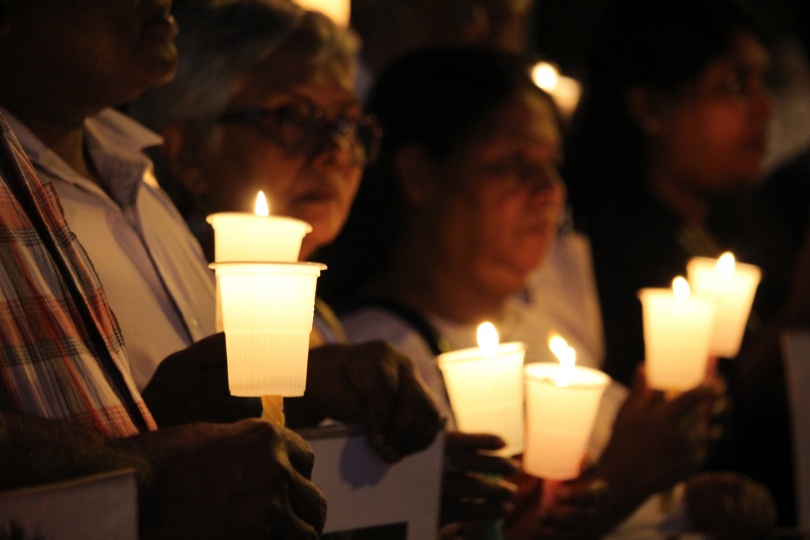Online threats create new dangers for reporters in Sri Lanka
The Sri Lanka situation in many ways represents what is being experienced across the globe – journalists are not equipped deal with online threats, harassment or direct attacks. Very few recognise the emotional toll and impact on their lives.

Sri Lanka journalists and activists take part in a candlelight vigil commemorating slain colleagues on January 31, 2020.
Journalists under threat during elections is nothing new in Sri Lanka. But the nature of these threats is changing.
The November elections illustrate just how underprepared journalists are when it comes to dealing with newer and faster methods of intimidation: online threats and harassment.
Social media played a key role during the most recent elections, one that will likely increase in the lead-up to parliamentary elections in April. Facebook was the platform of choice, and despite its pledge to monitor disinformation – alongside similar promises from the Election Commission – very little monitoring took place.
In this unregulated environment, online threats proliferated and journalists received direct threats – the abuses and racist taunts were filled with the worst sort of vitriol.
Though online threats have not gone beyond the virtual, journalists often lack the ability to assess cyber threats and their emotional impact.
Several journalists I have been in touch with were threatened during the Presidential Election campaign and thereafter. All of them were at a loss as to how to handle them and continued with their work. The extent of their response was to block trolls. “Several journalists have switched to more secure networks like Signal,” one journalist told me. “Other than that, I am not aware of any other techniques.”
Their work was also affected. Most were unsure whether to take threats seriously, and they did not have any methods at their disposal for detecting when and how these threats could manifest physically.
Without acknowledgement, the toll was clear. They were thinking about these threats, they were altering the way they work and the way they interacted with sources in public and on social media. Self-censorship took hold and intensified after the election results were announced.
“Most outspoken journalists now think twice before being critical,” one journalist told me. “Through unofficial channels, some have been told to slow down.”
Journalists’ Twitter accounts have mostly gone to wait and watch mode. Since the election, two unfettered social media accounts have gone silent; one was recently deactivated. At least one journalist has moved out of the country. The trepidation is tangible in WhatsApp groups, where until recently bravado ruled.
The Sri Lanka situation in many ways represents what is being experienced across the globe – journalists are not equipped deal with online threats, harassment or direct attacks. Very few recognise the emotional toll and impact on their lives.
Below are tips and resources for how to deal with trolls, hate speech and online harassment:
- A tip sheet for journalists and newsroom managers on dealing with online hate speech and harassment.
- Advice to fight online harassment from a 2017 Global Investigative Journalism Conference panel includes the following tips:
- Take action that gives you back a sense of control and agency.
- Limit your social media dosage.
- Consider having different accounts for your private and personal use.
- Build networks of solidarity and support. Editors, colleagues and friends need to allow the person being attacked the space to express their feelings and to give them appropriate support.
- Check how you hold your anger – being angry is one thing, when it turns to hatred it’s not good.
- Deflate your enemy. It’s not just a case of “not feeding the trolls” but controlling them, it’s also about not feeding the obsession of being trolled.
- Practice mindfulness. It’s about bringing power back to your immediate present. It’s also about self-care.
- Search to see what information is publicly available about yourself with a browser that you don’t often use. Knowing how public your personal information is will allow you to take appropriate measures.
- Reach out to other journalists and institutions that offer help, advice and support.
- Troll Busters: first responders for journalists experiencing online violence, abuse and other bad behavior.
- This tip sheet, drawing on interviews with nine leading women in journalism and other sources, offers strategies for recognizing, mitigating and addressing sexual harassment and other predatory behavior while reporting.
- This fact sheet summarizes key information about the online harassment of journalists.
































































































